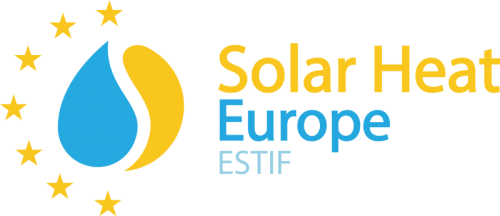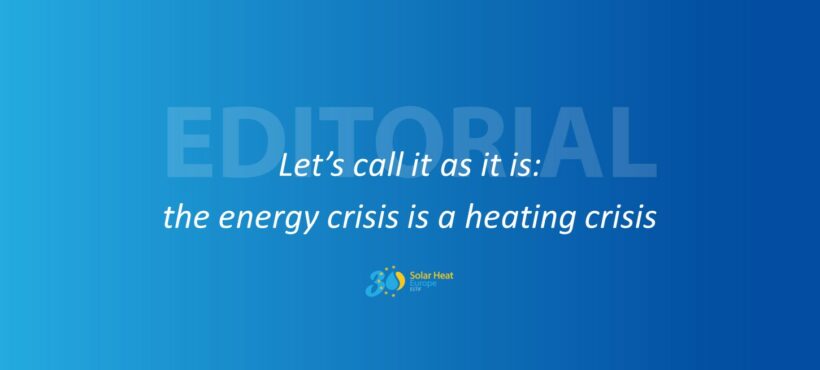Over the last several months, the energy crisis has been at the centre of the political debate both at the national and EU levels. Amplified by the consequences of the Russian aggression against Ukraine, Europe’s overreliance on Russian gas and on fossil fuels overall is having daunting consequences in terms of energy prices and energy security.
The crisis has opened a window of opportunity for more ambitious climate and energy objectives, presented by the European Commission earlier this year as part of the REPowerEU plan, with several legislative proposals already put forward or expected in the upcoming months.
Nevertheless, emergency interventions can also lead to rushed decisions that focus excessively on the short term and are detrimental to long-term objectives, for example by locking in investments in fossil fuels or establishing new strategic dependencies.
Today, the solution must be a stronger and faster push for renewable energy and storage, both power and thermal. Heat is half of the EU energy consumption and deploying renewable heat solutions are a key element of any sustainable response. Crucially, there is no silver bullet: all renewables and technologies must contribute. At the same time, heating and cooling, as the largest energy consuming sector, must be prioritised and addressed through targeted measures that valorise available technologies and cost-efficient solutions, such as solar thermal. In addition, new measures must avoid establishing new strategic dependencies – we cannot replace our dependency from Russian gas by even more Europe’s dependency on China’s supply of critical materials and components.
Recent developments in policy
- Following the State of the Union on 14th September, the European Commission has put forward new emergency actions on energy prices, which complement the previous measures on filling gas storage and reducing gas demand adopted during the summer. The package includes targets to reduce electricity and peak electricity demand, a cap on low-cost electricity sources (such as renewables), and a solidarity contribution for fossil fuel companies on excessive profits in 2022. Notably, an overall reform of the electricity market and the introduction of a cap on gas prices have been postponed. The Member States now have to agree on the proposed measures and will meet on 30th September for an extraordinary Energy Council meeting. Solar Heat Europe has presented its key messages in a press release, stressing how renewable heating can support decarbonisation while reducing electricity demand and the need to ensure full transparency on the use of financial resources and the costs of Europe’s dependency on fossil fuels.
- On 14th September, the European Parliament voted on two key files: the Renewable Energy Directive and the Energy Efficiency Directive. In both cases, more ambitious targets were adopted and will represent the starting position in the upcoming Trilogue negotiations with Member States and the Commission. Particularly important for the sector are the increased targets for the overall share of renewables (45%) and for renewables in the heating and cooling sector (annual increases of 2,3 percentage points), as well as the introduction of sub-sectoral targets for industry, buildings and energy storage. Solar Heat Europe summarised its position on the vote in a press release.
Next in policy
- The ITRE committee is discussing the draft report on the REPowerEU targeted amendments to the Renewable Energy Directive, which concerns permitting procedures of renewable energy projects. Solar Heat Europe presented its position in the contribution to the open consultation on the Commission’s proposal and is now working to ensure that the ITRE committee takes its messages into consideration in the final report.
- In the next weeks (likely on 26th October), the ITRE committee will also vote on the report on the Energy Performance Buildings Directive recast, which is of paramount importance to the sector. In fact, as part of the Solar Energy Strategy, the Commission proposed a new article introducing a solar mandate in buildings that include solar technologies, namely solar thermal and/or PV.
The energy crisis is putting European consumers and businesses at risk, and we must move forward by addressing the core of the problem, not only its effects. To achieve EU’s security and climate objectives, a higher focus must be put on the heating and cooling sector, which represents half of the EU energy consumption. The lack of political support for the decarbonisation of the sector is now showing its costs in terms of security of supply and energy affordability. The heating and cooling sector must be revamped completely, and renewable heat solutions must take center stage in this transition.
All renewables must play their part. In this case, solar thermal technologies address multiple priorities: they provide fully renewable energy and unparalleled energy storage capacity, thus reducing electricity demand and peak consumption.
Considering the energy crisis, heating and cooling is receiving more attention. In this context, the renewable heating & cooling sector must join forces and raise awareness on the huge potential that lays behind the technologies to decarbonise and strengthen the largest part of our energy system.
Within the solar thermal sector, we call on our members and industry, to work with us to improve solar heat’s position in the energy debate by promoting the Solar Thermal Roadmap for 2030, and supporting advocacy efforts at the EU, national and local levels.
Together we can move towards Energising Europe with Solar Heat.
Solar Heat Europe team


Leave a Reply